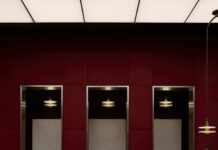[ad_1]

Setting up a home office provides many opportunities to build an ideal workspace. With over 9 million people in the US primarily working from home, it is essential to prioritize comfort and productivity. It’s easy to focus on the basics, such as finding a comfortable office chair or a desk that fits in your office well. However, forgetting to consider proper lighting altogether or using lighting ineffectively are common mistakes when putting together a home office. Poor lighting can lead to eyestrain, headaches and decreased productivity. To create a more enjoyable work environment, be sure to avoid making the following mistakes.
Mistake #1: Not Considering Lighting at All
You may splurge on the newest ergonomic keyboard or an original piece of art for your home office, but don’t neglect to consider the lighting of your space. Before settling on the layout of the room, consider the natural lighting the room provides and build around it. If you have a window, position your desk near to and perpendicular to it. This enables you to take advantage of the natural light while preventing the sun from causing glare on your computer screen. Use adjustable window coverings to easily control the sunlight. After you arrange your work area around the natural light available, then consider your overhead lighting and task lighting.

Mistake #2: Relying Solely on Overhead Lighting
Although a room’s existing lighting may seem sufficient, don’t make the mistake of relying only on overhead lighting. Consider incorporating additional lighting to enhance your work environment. Floor lamps or task lighting, such as desk lamps, pendant lights or under cabinet lights can complement your home office’s overhead lighting. When combined with existing overhead lights, floor lamps can make the overall lighting more balanced and even. Alternatively, when used alone, floor lamps can provide a cozy and more relaxed atmosphere.
Even with sufficient overhead lighting, task lighting is essential for focused activities such as reading, writing, or working on projects with small details. A stylish, adjustable desk lamp can pay dividends in productivity through minimizing shadows, reducing eye strain and increasing visibility.
Mistake #3: Using Desk Lamps Incorrectly
A well-placed desk lamp can increase your productivity and decrease eye strain while working on small tasks. A desk lamp should not positioned directly above or behind your computer screen as this can cause glare. Instead, place the lamp on the opposite side of your dominant hand to avoid casting shadows on your work. Don’t place your desk lamp too far away from where you will be working on those detailed tasks. This can create shadows which can cause eye fatigue. Alternatively, placing it too close can increase glare. Optimal placement should provide even lighting with no glare or shadows. Be sure to invest in an adjustable lamp with a flexible neck and tunable brightness, so that you can customize your task lighting for the specific job at hand.
Mistake #4: Not Personalizing and Customizing Your Space
Ensuring you have adequate lighting is just the beginning of creating an enjoyable space. Don’t forget to personalize your office; it doesn’t have to feel like a traditional office setting. In fact, creating a cozier, warmer space can increase productivity. Choose floor and desk lamps that reflect your unique style, and consider exploring other lighting solutions such as pendant lights if they fit your aesthetic.
LED A19 Smart Bulb – IRT-10207
Also, consider the ideal color temperature for your lights. Color temperature can impact your mood and change the atmosphere of your office. Cooler bulbs (4000K-6500K) mimic daylight, while warmer, softer lights (2200K-3000K) create a more relaxed atmosphere. Dimmable options can contribute to a cozier environment. You may even consider smart LED bulbs so you can adjust the color temperature based on your current project and/or mood. Keep in mind that using lights with different color temperatures simultaneously can create a visually unbalanced environment. A consistent color temperature throughout both your ambient and task lighting can increase visual appeal.
Optimizing the lighting in your home office can increase productivity, reduce eye strain, and generally make your workspace a more enjoyable place to be. Don’t neglect to personalize your space with a customized combination of overhead and task lighting so that your home office becomes the place you get to work, not the place you have to work.
[ad_2]
blog.1000bulbs.com










